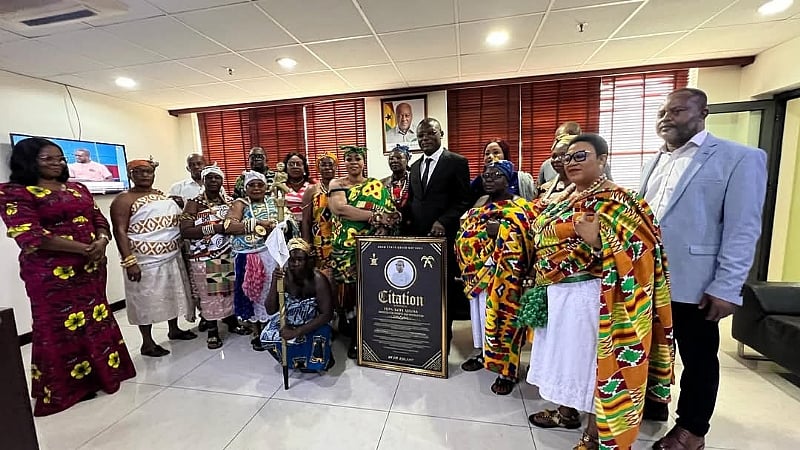The Queen Mothers of the Buem State, representing the traditional authority and wisdom of the region, recently convened at the parliamentary office of Hon. Kofi Adams, Member of Parliament for the Buem Constituency and Minister for Sports and Recreation. This significant visit served as a dual-purpose occasion: to formally congratulate Hon. Adams on his re-election and ministerial appointment, and to present a comprehensive set of proposals aimed at empowering women and youth within the Buem Traditional Area. The presence of these esteemed leaders underscored the importance of collaboration between traditional and elected authorities in achieving sustainable and inclusive development. This meeting exemplified the powerful potential of such partnerships in driving positive change at the community level.
The delegation of Queen Mothers, led by Nana Appewbea III, Chairperson of the Buem State Queen Mothers, included other prominent figures such as Nana Okrebea, President; Nana Abulati Boasuma I, Vice President; Nana Boatemaa III, Treasurer; and Mrs. Patience Smile Daves, Executive Secretary. Their collective presence carried weight and significance, reinforcing the gravity of their mission to advocate for the needs of their community, particularly its women and youth. The Queen Mothers’ visit was not simply a formality; it represented a powerful statement of their commitment to working with elected officials to advance the well-being of their people. Their presentation of a citation in Hon. Adams’ honor symbolized their recognition of his past efforts and their expectation of his continued dedication to the Buem constituency.
The Queen Mothers expressed their deep appreciation for Hon. Adams’ prior work in the constituency and urged him to prioritize programs that uplift women and youth, recognizing their critical role in community growth and prosperity. They emphasized the urgent need for targeted support, highlighting the specific challenges these demographic groups face in accessing opportunities for education, economic empowerment, and social advancement. Their proposals, presented with a clear sense of purpose and backed by their collective authority, served as a call to action for Hon. Adams to champion policies that would create a more equitable and prosperous future for all members of the Buem community.
Hon. Kofi Adams, in accepting the congratulations and the citation, expressed his profound gratitude for the Queen Mothers’ visit and the honor they bestowed upon him. He acknowledged the significance of their endorsement and pledged his commitment to carefully consider and act upon their proposals for empowering women and youth in the Buem Traditional Area. His response reflected an understanding of the important role traditional leadership plays in community development and a willingness to work collaboratively with these leaders to achieve shared goals. This respectful exchange further cemented the partnership between the traditional and elected authorities, setting the stage for productive collaboration in addressing the needs of the Buem constituency.
Hon. Adams further emphasized the crucial role of traditional leadership in driving development and fostering unity within the constituency. He acknowledged the wisdom and experience of the Queen Mothers, recognizing their deep understanding of the community’s needs and challenges. He solicited their continued prayers and support, underscoring the importance of collaborative efforts and shared responsibility in pursuing progress and prosperity for the people of Buem. This reciprocal gesture of seeking guidance and support from the Queen Mothers reinforced the spirit of partnership and mutual respect between the two forms of leadership.
The meeting between Hon. Kofi Adams and the Queen Mothers of the Buem State showcased the importance of collaboration between traditional and elected officials in achieving meaningful and sustainable development. The Queen Mothers, representing the historical and cultural roots of the community, brought forth the voices and needs of their constituents, particularly women and youth, urging targeted interventions to empower these groups. Hon. Adams, in turn, acknowledged the significance of their input and committed to incorporating their proposals into his agenda. This meeting serves as a powerful example of how traditional and modern governance structures can work together to create a more inclusive and prosperous future for their communities. It stands as a testament to the potential of collaborative leadership in addressing complex societal challenges and fostering positive change at the local level. The partnership forged between these two forms of authority offers a promising model for other communities seeking to promote inclusive growth and development.


